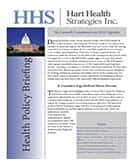2024 Election Results
November 20, 2024
Affordable Care Act, Medicaid, Medicare, Medicare Advantage, November 20, 2024
2024 Election Results-The Associated Press announced on November 6 that former President Donald Trump had reached the 270 electoral votes needed to win the 2024 presidential election. Trump outpaced his 2020 election performance, while Vice President Kamala Harris did not perform as well as Joe Biden did as the Democratic presidential candidate four years ago. Trump ultimately won 312 electoral votes to Harris’ 226 and successfully captured all seven swing states in play this election cycle: Arizona, Nevada, Georgia, North Carolina, Pennsylvania, Michigan, and Wisconsin.
Republicans also gained control of the Senate in the 2024 elections, flipping seats in West Virginia, Montana, Ohio, and Pennsylvania. The Senate balance of power for the 119th Congress currently stands at 53 seats for the GOP and 46 seats for Democrats. Ruben Gallego (D) is currently leading Kari Lake (R) in the Arizona race to fill retiring Sen. Kyrsten Sinema’s (I) seat. It should also be noted that Sen. Bob Casey (D-Pa.) has not yet conceded his race. While the Associated Press called the Pennsylvania Senate race in favor of Republican David McCormick, there remain more than 100,000 ballots left to be counted. Ohio Governor Mike DeWine (R) will appoint a replacement for Vice-President-elect JD Vance upon Vance’s resignation from the Senate. That individual will serve in the Senate until a special election in 2026. Vance may choose to resign before the inauguration on January 20 to give his replacement more seniority for the purposes of committee assignments. Most freshmen members will be sworn in on January 3 at the start of the new Congress.
While the results remain pending in a handful of races, Republicans appear close to the threshold of retaking control of the House of Representatives as well. The GOP currently holds 213 seats to Democrats’ 203, with 218 needed for the majority. As of Sunday, nineteen races have yet to be called, with Democrats leading in the vote count in 11 races and Republicans leading in the remaining nine.
Hart Health Strategies Inc. has specifically tracked the election results for health professional candidates in the 2024 elections. This information can be found as an addendum to the newsletter on page 5.
What to Expect in the Lame Duck-Congress returns on Tuesday to begin the lame duck session of the 118th Congress. During this time, Congress will meet to wrap up urgent or unfinished business. New member orientation and congressional party elections to determine who will lead the Democratic and Republican parties during the 119th Congress will also occur during the busy lame duck session. The House of Representatives is currently scheduled to adjourn on December 19, 2024, and the Senate is scheduled to adjourn on December 20, 2024. Lawmakers will have approximately 20 working days to accomplish a number of major policy priorities that await congressional action, including passage of fiscal year 2025 appropriations and avoiding a government shutdown, consideration of a supplemental disaster aid package, confirmation of the outgoing Biden administration’s judicial nominees, and taking action on a short term fix to prevent the anticipated 2.83% cut to the Medicare physician fee schedule set to take effect on January 1. Hart Health Strategies’ guide to the 2024 lame duck session containing further details is included as an addendum to this newsletter starting on page 8.
Trump’s First 100 Days-Under the forecasted unified GOP control of the White House and Congress starting in 2025, Republicans are expected to quickly pass a budget reconciliation package allowing President Trump to carry out the significant tax cuts promised during his campaign. Lawmakers will prioritize extension of the 2017 Tax Cuts and Jobs Act-set to expire at the end of 2025-for inclusion in the package. The special rules that accompany the reconciliation process would enable Republicans to circumvent a Democratic filibuster in the Senate; legislation otherwise requires 60 votes to advance through the upper chamber. In addition to addressing the expiring tax breaks, the reconciliation bill could also include spending cuts and certain regulatory reforms. Republicans are also expected to use reconciliation to address funding for major new border security initiatives, given Donald Trump’s emphasis on securing the border throughout his time as a politician. Measures to increase health care cost transparency may also be considered for inclusion in the reconciliation legislation.
Trump Personnel Forecast-President Trump is expected to begin making decisions on key administration personnel positions in the coming days and weeks. It was announced last Thursday that Susie Wiles will serve as Trump’s chief of staff. Wiles led Trump’s campaign for the past two years. She previously led his Florida operations in the 2016 campaign and worked on Ron DeSantis’s (R) Florida gubernatorial campaign.
In 2016, Trump announced his choice for Health and Human Services Secretary 20 days following his election victory. Along with personnel from his first administration, the following individuals have been spotlighted for their potential to be selected to serve in administrative positions that impact health policy during Trump’s second term in office:
- Robert F. Kennedy Jr. is a former independent presidential candidate and anti-vaccine activist. He is the nephew of President John F. Kennedy and son of former Attorney General and Senator Robert F. Kennedy. He has spearheaded the “Make America Healthy Again” movement, which focuses on chronic disease prevention. RFK has attested that President-elect Trump has promised him “control of the public health agencies.” Siblings and health entrepreneurs Casey and Calley Means, who have helped lead the MAHA initiative, could also be considered for potential health roles in the administration.
- Bobby Jindal is the former governor of Louisiana and principal adviser to the U.S. Department of Health and Human Services (HHS) secretary during the George W. Bush administration. He currently leads the health policy division of the America First Policy Institute.
- Eric Hargan served as deputy HHS secretary and acting HHS secretary following the resignation of Tom Price during Trump’s first term. In such capacity, he helped oversee Operation Warp Speed and other aspects of the COVID-19 pandemic response.
- Paul Mango served as HHS Deputy Chief of Staff during Donald Trump’s first term in office. Before joining the government in 2018, he spent nearly 25 years as a consultant in, and leader of, McKinsey & Company’s Health Care Practice.
- Joe Grogan is the former Domestic Policy Council Director and assistant to President Donald Trump.
- Ben Carson is a retired neurosurgeon and Donald Trump’s former Secretary of Housing and Urban Development. Dr. Carson and the President-elect remain close friends.
- Brian Blase previously served as Donald Trump’s Special Assistant for Economic Policy at the National Economic Council. He currently leads the Paragon Health Institute.
- Jim O’Neill is a science and technology investor and former HHS principal associate deputy secretary during the George W. Bush administration. Former President Trump previously considered O’Neill to serve as Commissioner of Food and Drugs.
- Scott Gottlieb previously served as Donald Trump’s FDA Commissioner. He currently works for the American Enterprise Institute, at a venture capital firm called New Enterprise Associates, and on the board of Pfizer and Illumina.
- Theo Merkel previously served as Donald Trump’s Special Assistant for Economic Policy at the National Economic Council. He worked for former Sen. Pat Toomey (R-Pa.) for more than a decade, including as his Legislative Director. He currently works at the Paragon Health Institute and the Manhattan Institute.
VA Congressman Announces Cancer Diagnosis-Rep. Gerry Connolly (D-Va.) announced last week that he has been diagnosed with cancer of the esophagus. Connolly stated in a letter to his constituents that he will begin chemotherapy and immunotherapy “right away” but that he is “very confident in a successful outcome” and that he will continue to do his job in both his district and on Capitol Hill. Connolly was reelected to a ninth term by more than 30 percentage points on Tuesday.
Upcoming Congressional Hearings and Markups
Senate Judiciary Committee hearing “How Bump Stocks and Other Conversion Devices are Amplifying the Gun Violence Epidemic;” 10:00 a.m.; November 13
Senate Judiciary Committee markup including S. 2140, Patent Eligibility Restoration Act; 10:00 a.m.; November 14
House Select Subcommittee on the Coronavirus Pandemic hearing “Preparing for the Next Pandemic: Lessons Learned and The Path Forward;” 11:30 a.m.; November 14
House Veterans’ Affairs Subcommittee on Health hearing “Life After Limb Loss: Examining VA Amputee Prosthetics Care;” 2:30 p.m.; November 20
Recently Introduced Health Legislation
H.R.10085-To require that opioid overdose rescue kits be located at public institutions of higher education, and for other purposes. Sponsor: De La Cruz, Monica [Rep.-R-TX-15]; Committees: House-Education and the Workforce; Energy and Commerce
H.R.10086-To amend title XVIII of the Social Security Act to codify the Medicare low-wage index hospital policy. Sponsor: Ferguson, A. Drew [Rep.-R-GA-3]; Committees: House-Ways and Means
H.R.10093-To amend title 10, United States Code, to direct the Secretary of Defense to include certain tests as part of the periodic health assessments provided to members of the Armed Forces. Sponsor: Luttrell, Morgan [Rep.-R-TX-8]; Committees: House-Armed Services
H.R.10095-To amend the Patient Protection and Affordable Care Act to reduce fraudulent enrollments in qualified health plans, and for other purposes. Sponsor: Ross, Deborah K. [Rep.-D-NC-2]; Committees: House-Energy and Commerce
H.R.10096-To amend title XIX of the Social Security Act to ensure access to immunizations under the Medicaid program and the Vaccines for Children program, and for other purposes. Sponsor: Schrier, Kim [Rep.-D-WA-8]; Committees: House-Energy and Commerce
H.R.10097-To amend title XVIII of the Social Security Act to adjust the hospice program survey and enforcement procedures under the Medicare program. Sponsor: Van Duyne, Beth [Rep.-R-TX-24]; Committees: House-Ways and Means
H.R.10098-To amend title XXVII of the Public Health Service Act to extend group health plan and health insurance coverage to parents of enrollees if such parents are not eligible to enroll in the Medicare or Medicaid program. Sponsor: Van Duyne, Beth [Rep.-R-TX-24]; Committees: House-Ways and Means; Energy and Commerce
H.Res.1563-Expressing the sense of Congress that the United States is committed to ensuring a safe and healthy climate for future generations, and thus to restoring the climate; Sponsor: Thompson, Mike [Rep.-D-CA-4]; Committees: House-Energy and Commerce; Foreign Affairs
Health Professionals in the 119th Congress
Health Professionals Not Returning for the 119th Congress
The following health professionals will not be returning for the 119th Congress due to retirement or loss in primary or general election:
| Name | Specialty | Party | District |
| Rep. Michael Burgess, MD | OB-GYN | Republican | TX-26 |
| Rep. Brad Wenstrup, DPM | Podiatrist | Republican | OH-02 |
| Rep. Drew Ferguson, IV, DMD, PC | Dentist | Republican | GA-03 |
| Rep. Larry Bucshon, MD | Cardiothoracic surgeon | Republican | IN-08 |
| Rep. Cori Bush, RN | Registered nurse | Democrat | MO-01 |
| Rep. Yadira Caraveo, MD | Pediatrician | Democrat | CO-08 |
New Health Professionals in the 119th Congress
The following health professionals won their elections and will join the 119th Congress as new members of the House of Representatives:
| Name | Specialty | Party | District | Opponent |
| Kelly Morrison, MD | OB-GYN | Democrat | MN-03 | Tay Jude (R)
(open seat due to Dean Phillips (D) retirement) |
| Maxine Dexter, MD | Pulmonary and critical care physician | Democrat | OR-03 | Joanna Harbour (R)
(open seat due to Earl Blumenauer (D) retirement) |
| Mike Kennedy, MD | Family physician | Republican | UT-03 | Glenn J. Wright (D)
(open seat due to John Curtis (R) running for Senate) |
| Bob Onder, MD | Allergist-immunologist | Republican | MO-03 | Bethany Mann (D)
(open seat due to Blaine Luetkemeyer (R) retirement) |
| Herb Conaway, MD | Doctor of internal medicine | Democrat | NJ-03 | Rajesh Mohan (R)
(open seat due to Andy Kim (D) running for Senate) |
| Sheri Biggs, DNP | Family and Mental Health Nurse Practitioner | Republican | SC-03 | Bryon Best (D)
(open seat due to Rep. Jeff Duncan (R) retirement) |
Returning Health Professionals in the 119th Congress
The following incumbent health professionals won their elections and will return to the House of Representatives for the 119th Congress:
HOUSE OF REPRESENTATIVES
| Name | Specialty |
| Rep. Brian Babin, DDS (R-TX-36) | Dentist |
| Rep. Ami Bera, MD (D-CA-06) | Internal medicine physician |
| Rep. Buddy Carter, BSPharm (R-GA-01) | Pharmacist |
| Rep. Scott DesJarlais, MD (R-TN-04) | General medicine |
| Rep. Neal Dunn, MD (R-FL-02) | Urologist |
| Rep. Paul Gosar, DDS (R-AZ-09) | Dentist |
| Rep. Mark Green, MD (R-TN-07) | Emergency physician |
| Rep. Andy Harris, MD (R-MD-01) | Obstetric anesthesiologist |
| Rep. Diana Harshbarger, PharmD (R-TN-01) | Pharmacist |
| Rep. Ronny Jackson, MD (R-TX-13) | Emergency physician |
| Rep. John Joyce, MD, FAAD, FACP (R-PA-13) | Dermatologist |
| Rep. Jen Kiggans, RN, AGNP (R-VA-02) | Geriatric nurse practitioner |
| Rep. Rich McCormick, MD (R-GA-06) | Emergency physician |
| Rep. Raul Ruiz, MD, MPP, MPH (D-CA-25) | Emergency physician |
| Rep. Kim Schrier, MD (D-WA-08) | Pediatrician |
| Rep. Mike Simpson, DMD (R-ID-02) | Dentist |
| Rep. Glenn Thompson, Med (R-PA-15) | Rehabilitation therapist |
| Rep. Lauren Underwood, RN (D-IL-14) | Registered nurse |
| Rep. Jeff Van Drew, DDS (R-NJ-02) | Dentist |
The following House race has not yet been called by the Associated Press:
| Name | Specialty |
| Rep. Mariannette Miller-Meeks, MD (R-IA-01) | Ophthalmologist |
UNITED STATES SENATE
All five incumbent health professionals in the United States Senate will continue to serve in the 119th Congress. Senator John Barrasso, from Wyoming was the only Senate health professional in cycle this year and retained his seat. Sen. Barrasso currently serves as chairman of the Senate Republican Conference and plans to seek the #2 Republican leadership post in the 119th Congress.
| Name | Specialty |
| Sen. John Barrasso, MD (R-WY) | Orthopaedic Surgeon |
| Sen. John Boozman, OD (R-AR) | Optometrist |
| Sen. Bill Cassidy, MD (R-LA) | Gastroenterologist/Hepatologist |
| Sen. Roger Marshall, MD (R-KS) | OB/GYN |
| Sen. Rand Paul, MD (R-KY) | Ophthalmologist |
Lame Duck Session 2024
Lame Duck
The Lame Duck Session of the 118th Congress is scheduled to begin on November 12, 2024. ‘Lame Duck’ refers to the period of time after the November 5, 2024, elections and before the 119th Congress is sworn into office on January 3, 2025. During this time, Congress will meet to wrap up urgent or unfinished business. Currently, the House of Representatives is scheduled to adjourn on December 19, 2024, and the Senate is scheduled to adjourn on December 20, 2024.
Prior to the adoption of the Twentieth Amendment to the Constitution in 1933, new congresses convened in December of odd-numbered years-meaning Congress would meet and pass legislation for more than a year post-election. The Twentieth Amendment, which changed the president’s term from March 4 to January 20, also changed the convening date for a new Congress to January 3 of odd-numbered years.
Timing
Lawmakers have approximately 20 working days (i.e., days in which Congress plans to be in session or hold votes) to accomplish a number of major policy priorities awaiting congressional action-policies which may be considered “must pass” before the end of the session. New member orientation and congressional party elections to determine who will lead the Democrat and Republican parties during the 119th Congress will also occur during the busy lame duck session. New member orientation usually occurs prior to Thanksgiving, while congressional party elections are expected in November and early December. The House and Senate calendars for 2025 also will be announced during this time. However, congressional committee assignment determinations may not be known until January.
Politics
Lame duck sessions are characterized by the fact that some members of Congress will finish their terms and not return in January for the 119th Congress. Thus, non-returning members may not be as beholden to typical political dynamics as their colleagues. These members may also push for the passage of “legacy” legislation and priorities.
During the lame duck, Congress is expected to negotiate the following key issues and will need to determine whether they can complete negotiations or must instead pass extensions in order to address the policies during the next Congress. The scope and content of this work will be shaped by the upcoming Trump administration, the Republican majority in the Senate and the pending results of the November election to determine the majority of the House of Representatives.
Avoiding Government Shutdown
The current continuing resolution (CR), extending funding for the 12 annual appropriations bills, was passed before the election and expires at midnight on December 20, 2024. Congress must act again before this funding deadline to pass either another CR or a fiscal year (FY) 2025 appropriations measure to avoid a federal government shutdown. While House Speaker Mike Johnson (R-La.) has opposed a year-end omnibus spending package, maintaining this position may prove difficult. To date, the House has only passed four individual spending bills, while the Senate has not passed any. The House Republicans may push for a shorter-term CR to allow funding decisions to be revisited under the Trump administration, while Senate Democrats may push for a longer-term package that can be signed into law before President Biden’s term ends.
Disaster Aid
Congress is expected to take up a supplemental disaster aid package during the lame duck to assist communities impacted by hurricanes Helene and Milton. The Small Business Administration estimates that it needs about $1.6 billion to replenish the exhausted disaster loan program, while the Federal Emergency Management Agency’s disaster relief fund also needs additional resources.
Veterans Affairs
The Department of Veterans Affairs is once again warning of a potential budget shortfall in FY 2025 and is requesting $12 billion in additional funding to ensure veterans’ continued access to medical care.
Defense Authorization
Congress has yet to take up the National Defense Authorization Act (NDAA), which is typically advanced with strong bipartisan support. While negotiations have been complicated by ongoing conflicts around the world, particularly in Ukraine and the Middle East, the package is considered “must pass” and may provide a legislative vehicle for unrelated provisions that Congress wants to pass by the end of the year.
Farm Bill
Passage of the farm bill-authorization for agriculture and commodity programs-remains a bipartisan priority on Capitol Hill. While half of the Republican conference in the House is urging leadership to take up a GOP-led bill, other lawmakers are pushing for consideration of bipartisan legislation before the end of the year.
Nominations
The Senate is expected to be focused on confirming the outgoing Biden administration’s judicial nominees during the Lame Duck session, particularly because Republicans will control the upper chamber in the 119th Congress and will focus on confirming President-elect Trump’s nominees. A total of 234 of former President Trump’s judicial nominees were successfully confirmed by the end of his term; President Biden’s tally currently stands at 213.
Medicare Physician Payment
More than 200 members of the House have written to congressional leadership urging action to prevent the anticipated 2.8% cut to the Medicare physician fee schedule set to take effect on January 1. While the hope is that a short-term fix to address the impending Medicare reimbursement cut is passed during the lame duck, longer-term reforms (e.g., an inflationary payment update or a budget-neutrality threshold increase) will likely be punted for future consideration.
Telehealth
Without congressional action, COVID-era telehealth flexibilities are currently set to expire at the end of this year. Both the House Ways and Means and Energy and Commerce committees have advanced two-year extensions with strong bipartisan support, with reforms to the pharmacy benefit manager (PBM) industry included to offset the projected costs.
Pharmacy Benefit Manager Reform
Congressional committees have advanced more than 30 bills related to PBM reform during the 118th Congress. Of note is the Lower Costs, More Transparency Act (H.R. 5378), which passed the House last December and is estimated to reduce the federal deficit by $715 million over the next decade. Due to these estimated savings, advancing PBM reforms is more enticing as a lame duck vehicle to “pay for” other priorities.
Physician-Member Priorities
The GOP Doctors Caucus-and retiring physician-lawmakers in particular – have identified the following bills, in addition to addressing Medicare physician payment, as priorities for the remainder of the 118th Congress:
- The Improving Seniors-Timely Access to Care Act (S. 4532/H.R. 8702)-With 54 cosponsors in the Senate and 221 cosponsors in the House, this bill has secured support from a bipartisan majority in both chambers. The legislation would streamline and standardize the use of prior authorization by Medicare Advantage plans. The bill sponsors have worked to address a higher-than-expected cost estimate in the latest version of the legislation, which unanimously passed the House during the 117th Recently, the Congressional Budget Office (CBO) informed the bill sponsors that the legislation is not expected to increase federal spending – news that is expected to bolster the chance of passage before the end of the year.
- The Preventive Health Savings Act (S. 114/H.R. 766)-This bipartisan bill would provide a framework for committees of jurisdiction to request supplementary cost estimates for preventive health care legislation, expanding the typical 10-year budget window to a 30-years. The bill passed the House earlier this year and is awaiting action by the Senate.
- The Treat and Reduce Obesity Act (S. 2407/H.R. 4818)-This legislation would expand Medicare coverage of intensive behavioral therapy for obesity. The House Energy and Commerce Committee advanced the bill earlier this year.

Hart Health Strategies provides a comprehensive newsletter on a weekly basis that recaps the previous week and previews the week ahead.

Health on the Hill provides current happenings in health care within the Federal Government and on Capitol Hill.















